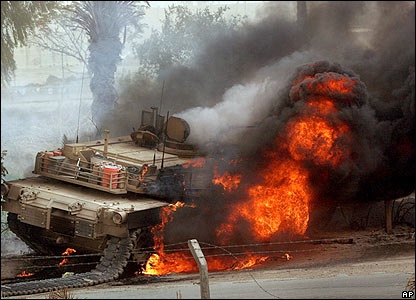2006 — A Year Of Military Setbacks
Some of the most significant events of the
outgoing year were in the military sphere - the defeat of the US-led coalition
forces in Iraq, the Israeli army’s setback in Lebanon, and the return of
the Taliban to Afghanistan despite the presence of 20,000 NATO troops
there.

I thought I’d offer up a
piece from the guys who had to learn why they lost a guerilla war — after
their government worked real hard at ignoring our own example in
VietNam.
Some of the most significant events of the outgoing year were in the military sphere - the defeat of the US-led coalition forces in Iraq, the Israeli army’s setback in Lebanon, and the return of the Taliban to Afghanistan despite the presence of 20,000 NATO troops there.
Paradoxically, semi-guerilla units, armed at best with Kalashnikovs, grenade launchers, and explosives they plant in cars or use in suicide bombings, are winning wars against regular armies, equipped with state-of-the-art military hardware and high technologies.
The latter have the most sophisticated satellite systems of control and communication, thermal imagers, radars, which can detect any moving or fixed objects, and even individuals, and means of radio electronic warfare.
Regular armies have super modern tanks, fighters, bombers, and cruise missiles - everything the great designer minds of the late 20th–early 21st centuries have managed to develop; they are also equipped with most advanced military ideas, tactics and operational skills, and have amassed the experience of all the past wars; these armies have top professionals whose training and education costs astronomical sums.
For all that, regular armies, on which more than half a trillion dollars are spent every year (that is, more than on all other armed forces put together) cannot do anything against the mujaheddins, armed with 50-dollar weapons.
I realize it’s tough to confront the tactical and political disaster Litovkin discusses. But, many of the folks who pass through these cyber-corridors order their lives and living within disciplines bounded by science and engineering. Some of that sense of order and logic certainly rubs off. The skills required to analyze real situations, quantifiable facts, might encourage an understanding of history and geopolitics.
Some of the most significant events of the outgoing year were in the military sphere - the defeat of the US-led coalition forces in Iraq, the Israeli army’s setback in Lebanon, and the return of the Taliban to Afghanistan despite the presence of 20,000 NATO troops there.
Paradoxically, semi-guerilla units, armed at best with Kalashnikovs, grenade launchers, and explosives they plant in cars or use in suicide bombings, are winning wars against regular armies, equipped with state-of-the-art military hardware and high technologies.
The latter have the most sophisticated satellite systems of control and communication, thermal imagers, radars, which can detect any moving or fixed objects, and even individuals, and means of radio electronic warfare.
Regular armies have super modern tanks, fighters, bombers, and cruise missiles - everything the great designer minds of the late 20th–early 21st centuries have managed to develop; they are also equipped with most advanced military ideas, tactics and operational skills, and have amassed the experience of all the past wars; these armies have top professionals whose training and education costs astronomical sums.
For all that, regular armies, on which more than half a trillion dollars are spent every year (that is, more than on all other armed forces put together) cannot do anything against the mujaheddins, armed with 50-dollar weapons.
I realize it’s tough to confront the tactical and political disaster Litovkin discusses. But, many of the folks who pass through these cyber-corridors order their lives and living within disciplines bounded by science and engineering. Some of that sense of order and logic certainly rubs off. The skills required to analyze real situations, quantifiable facts, might encourage an understanding of history and geopolitics.
Posted: Sat - January 6, 2007 at 04:19 PM